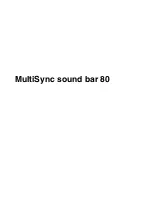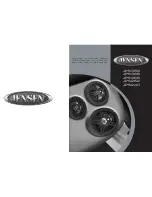
SUBWOOFER PLACEMENT
Bass is less and less directional as it goes down in frequency. For best sonic
integration, locating your Paradigm
®
Special Edition subwoofer between your
front speakers or beside one of them and close to the back wall will usually
provide the best bass performance. If this location is not possible your
subwoofer may be placed anywhere in the room without affecting the stereo
image of your front speakers or the soundstage of your multichannel speaker
system. See additional notes farther below about installing your subwoofer in
a cabinet or other discrete installation.
Fig. 13a and Fig. 13b, on page 9, highlight how bass output is generally affected
by room placement. When seated in a typical listening area of your room,
placing the subwoofer inside the “shaded” areas will typically result in bass
performance as follows:
Fig. 13a
:
Corner placement provides the most bass, but sometimes at the
expense of accuracy.
Fig. 13b
:
A subwoofer placed near a wall usually provides a good balance of
quantity and accuracy.
Controls on the back panel of your subwoofer are provided to align your
subwoofer’s output to the other speakers in your system, see “Fine Tuning,”
page 17.
The critically acclaimed optional
Paradigm Perfect Bass Kit
™
(PBK)
is a
wonderful tool to help you achieve optimal bass performance by arriving at
the ideal placement of the subwoofer in your room. (See below for more
information on the PBK).
Even when your subwoofer is perfectly positioned, the room can still have
a dramatic impact on performance. Room dimensions, dead spots, archways,
furniture placement and countless other factors can turn a room into an
additional instrument, playing alongside musicians or movie scores with
unwanted contributions of coloration and resonance. Although the Control
Facilities included on your Paradigm
®
Special Edition subwoofer allow you
to fine tune for optimal bass performance, the
Paradigm Perfect Bass Kit
™
(sold separately) corrects for the effects of the room, dramatically improving
bass definition, detail and dynamics.
(See your dealer for more information).
PARADIGM’S PERFECT BASS KIT
™
(PBK)
INSTALLATION IN A CABINET
When installing your subwoofer in a cabinet or other discrete installation it
must be in the front-firing configuration with the feet and adhesive felt pads
installed.
CHANGING THE SUBWOOFER DRIVER ORIENTATION:
DOWN-FIRING TO FRONT-FIRING (Fig. 12)
Your Paradigm
®
Special Edition subwoofer is designed for front-firing or
down-firing driver orientation. When you unpack the subwoofer it will be
in the down-firing position. Converting to a front-firing position is easy and
everything except the Phillips screwdriver is supplied. Instructions are
available in the pictorial at the beginning of this manual, or follow the the
written instructions below:
Procedure for Converting Driver Configuration:
1. Rotate subwoofer so driver points upward. To prevent scratching
subwoofer, lay it in original packing material or on a blanket.
Remove adhesive pads, set them aside;
2. Unscrew feet, set them aside;
3. Rotate subwoofer so that it sits in the forward-firing position. Unscrew
the hexagonal screw at each corner, set aside:
4. Attach the feet
(as shown), making sure indentations in the feet fit snug
on top of screw heads;
5. Attach supplied felt pads, making sure they sit in recessed areas on the
feet
(as shown);
6. Rotate the subwoofer so that it sits in the forward-firing position. Install
supplied plugs into exposed screw holes on face of subwoofer.
To avoid personal injury, install subwoofer in a location
where any rear amplifier parts cannot be accidentally
touched.
To allow air to circulate freely and prevent overheating
of the subwoofer, leave a minimum of 3˝ (7.6 cm) of
space between the sides of the cabinet and the front
and back sides of the subwoofer
(not shown).
Remove only the hexagonal screw in each corner. If
any other screws are removed it may cause permanent
damage to amplifier. This type of damage is not covered
by warranty. If you are not clear on this instruction,
refer to Fig. 12, Step 3, inset.
14
















































